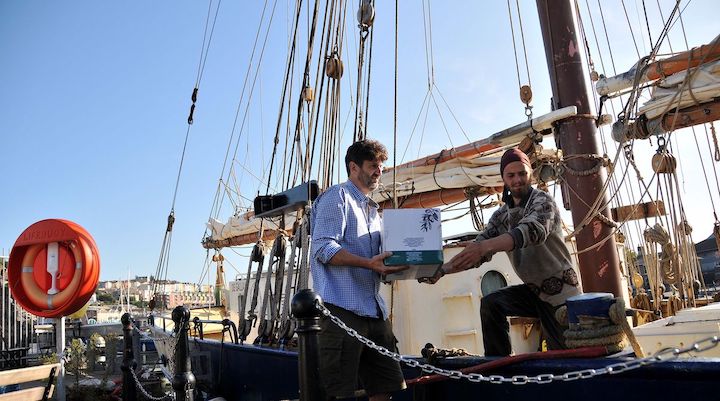There’s never been a more dreamy way to have your coffee delivered than a sailboat across the Atlantic.
A small number of specialty roasters in Europe are now offering beans that have been sailed — rather than shipped via fossil-fuel burning vessels — from South America. While they’re a rare luxury compared with standard bags of supermarket coffee, these wind-blown beans may inspire some imaginative ideas for finding and stamping out carbon emissions from your everyday life.
Here’s a glimpse of the journey: Roasters buy the beans directly from growers in countries like Colombia before they’re stored in a warehouse and loaded onto a sailboat — destined for ports like Le Havre, France or Penzance, England. The crossing typically takes six weeks. The beans are then couriered to specialty roasters before ending up in espressos served in coffee shops or at home.

“You’re one step away from the coffee being grown, almost,” said Richard Blake, founder of Yallah Coffee, a Cornwall-based roaster who sells beans sailed from Colombia. A 1-kilogram bag of Yallah Coffee’s Las Brisas beans costs £50 ($62) but boasts “a carbon footprint close to zero.” As a price comparison, the most expensive coffee beans UK supermarket Tesco Plc sells online is a 1-kilogram bag for £13.75 ($17).Blake said people are happy to pay for a premium product “if they feel like there is value in all the steps.”
“That can be lost with the homogenized mix of beans on a supermarket shelf,” he said, “whereas if it’s single origin, and if it’s on a ship, there’s less people in the chain, and that creates more value.”
A few years ago, a small group of environmentally focused entrepreneurs, such as Shipped by Sail in the UK, started using pirate-like schooners to prove that goods like coffee could be transported with near-zero emissions — even if it took more money and all the risks linked with crossing the Atlantic on hundred-year-old wooden boats for a couple dozen bags of high-end beans.
What started as bravado is now making a bit more business sense. Consumers have become more willing to pay extra for greener coffee and roasters are rising to the challenge to provide it to them.
Take Belco, a sustainable coffee importer based in France serving around 1,000 specialty roasters all over Europe. The company bought 22 tons of Colombian coffee delivered by a schooner earlier this year. It’s had such positive feedback from customers that they’re now planning to import at least half of their total coffee beans —about 4,000 tons — by sailboat by 2025. In order to do this, though, they’re going to need a bigger boat.
Belco is relying on shipments from France’s TransOceanic Wind Transport, a sailing freight transport company. To meet growing demands of customers like Belco, TOWT is building a sailing vessel capable of holding 1,100 tons of goods. The first ship is due in June next year and three more should follow by 2026.
On the other side of the Atlantic, Costa Rica’s SailCargo Inc. is preparing to sail South American beans north to customers like Serge Picard, the owner of Café William Spartivento, the biggest Canadian-owned roaster for Fair Trade Organic coffee. Café Williams said it has invested in a new SailCargo vessel that will carry 250 tons of goods when it’s expected to launch next year.
Years of innovation have given the coffee industry plenty of ways to reduce its carbon footprint on the farm level, from replacing chemical fertilizers with organic waste to using renewable energy to power equipment. Shipping has remained a weak spot. It might be more efficient to transport coffee beans by sea than air, but today’s cargo ship engines are driven by bunker fuel — the dregs of the oil refining process. Large sailboats have motors for when they’re needed, but their main source of power is emissions-free wind, which gives them the added benefit of being mostly immune to volatile oil prices.
To be sure, conventional freighters — which hold thousands of tons of goods — are much more economic than a ye olde pirate ship, or even a 1,000-ton sailing vessel, for transporting lots of different cargo like coffee. But that isn’t stopping some coffee importers and sailboat manufacturers from trying to overthrow the heavy ships’ command of the high seas.
Maxence Lacroix, co-founder of Belgian specialty roastery Javry, which acquired its first order of coffee beans via sailboat earlier this year, is keen to see disruption in the shipping industry.
“We need to be lots of small actors to be able to change things, because the bigger actors are definitely not going to do it,” he said. “The change must come from the bottom.”

Follow us on social media: